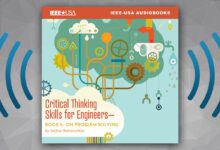
Role model: A person whose behavior, example, or success is — or can be emulated by — others, especially by younger people.
To provide pre-college and college-age students ” especially girls and underrepresented minorities ” with role models who can inspire them to pursue engineering careers, IEEE-USA Publishing is partnering with several leading educational organizations that promote STEM studies.
Pilot programs this spring and summer are putting free print compilations of the first eight volumes of the award-winning IEEE-USA Women in Engineering E-books in the hands of educators and students. In New Hampshire, approximately 200 copies of the anthologies were presented to middle- and high-school teachers who participated in the 2016 New Hampshire Girls Technology Day. In Texas, 100 high-school seniors who attend the Women Engineers at The University of Texas at Austin (WEatUT) event this July will receive copies of the books, as well.
Except for the first volume, an overview of women in STEM occupations, each IEEE-USA WIE e-book in the compilation is an autobiographical account of how a present-day woman engineer built her career. Each author candidly discusses the challenges and opportunities she dealt with in obtaining her education and advancing professionally. IEEE-USA Publishing launched the first four books in the series in 2014, added four new volumes last year, and is introducing four more in 2016.
“At a time when few educational institutions have budgets enabling them to purchase quality, collateral materials, it is clear we can help them — and also extend the reach of the IEEE-USA Women in Engineering e-book series,” says Leslie Martinich, who chairs IEEE-USA E-books. Georgia Stelluto, IEEE-USA Publishing Manager and IEEE-USA E-books Manager and Editor, adds, “The core message of each author’s first-person account is that talented women can and should pursue STEM educations and careers.”
During the week of 14 March in New Hampshire, 850 9th and 10th grade girls and 60 of their teachers attended the fourth annual Girls Technology Day, held on three of the state’s college campuses. While the students took part in hands-on workshops ranging from 3D modeling to game programming, the teachers attended sessions to enhance their skills in steering talented girls toward STEM fields.
“The teachers were delighted to receive printed copies of the IEEE-USA compilation,” reports Courtney Ritchings, of the Career Development Bureau (CDB), in the New Hampshire Department of Education. Jennifer Kiley, also with the CDB, explains, “Given the ongoing constraints of school budgets, educators are always looking for resources because they can’t obtain such materials on their own.”
A follow-up survey to teachers who participated in this year’s Girls Technology Day should provide information about the use and effectiveness of the IEEE-USA anthology in helping to inform and inspire students about STEM careers. The New Hampshire event focuses on freshman and sophomore students, because state educators believe that is when many students begin honing in on interests that ultimately may become career paths.
Almost 2,000 miles away at the Cockrell School of Engineering, at the University of Texas at Austin, the Women in Engineering Program (led by Tricia Berry) is gearing up for its 14th annual summer “camp” for girls. Formally known as Women Engineers at UT (WEatUT), the event will bring 70 girls ” all incoming high-school seniors ” to campus, where they’ll explore engineering through tours, hands-on projects and meetings with mentors. The program is partly funded by the Texas Workforce Commission ” Summer Merit Program.
“These four days are designed to enable the students to explore how engineering impacts society and benefits the world through sessions led by industry professionals, engineering faculty and graduate students,” explains Berry. “We place special emphasis on showing students the variety of backgrounds and experiences that engineers represent, especially to demonstrate how people just like them have overcome various struggles to pursue a technical career.”
This summer, each WEatUT participant will receive a copy of the IEEE-USA WIE anthology, in connection with one-on-one meetings they will have with working engineers. Berry believes that having role models is “very impactful” on the choices that students make, adding, “They want to see people who look like them, and who can tell them “If I could do it, you can, too.'”
The authors of the seven autobiographies in the compilation represent a wide range of backgrounds and experiences; each offers a real-life story to which almost any girl can relate, and from which she can take inspiration. For example, Maria Vlachopoulou, now a data analyst/program manager at Microsoft Corporation in Redmond, Wash., followed her instincts for math and science; along the way, she overcame financial pressures, almost no experience with computers, and mild dyslexia.
Another WIE e-book author is Jacquelyn Nagel, Ph.D., an assistant professor of engineering at James Madison University (JMU) in Harrisonburg, Virginia. The first engineer in her family, she earned her degrees while working part-time, as well as with significant help from scholarships and fellowships. In recent years, she has received national recognition for her pioneering work in biologically inspired design.
In mid-2015, Nagle suggested a partnership between JMU’s Engineering Department and IEEE-USA Publishing. She describes her own e-book as “a way to help others to learn from my mistakes, hardships and triumphs,” but adds that “it comes down to inspiring students ” as well as the parents, teachers and guidance counselors who influence them.”
With the support of Kurt Paterson, JMU Engineering Department Head, Nagel worked with IEEE-USA’s Georgia Stelluto to print not just Nagel’s book but also the first four volumes in the series. The anthology has been distributed both as a soft-cover, printed book; and an online PDF. Print versions have been disseminated at academic fairs and open houses; with access to online PDFs provided at workshops, and in engineering courses.
In return for supplying the free e-book compilation, IEEE-USA Publishing will receive extensive JMU tracking metrics. The first measurements will be available soon, but Nagle has observed that the volumes appear most effective with educators.
“Teachers want to be inspirational,” she says, “and when they have a conversation with a promising student about the personal stories in the book, they have a broad resource from which to draw ” the many types of engineering careers, the range of difficulties each woman overcame.
“Our society is recognizing that women and diverse populations belong in engineering, and it’s important that we have these role models,” Nagel adds. “Having role models can be very powerful to young girls, because they will feel like they fit in and are welcome here.”
IEEE-USA Publishing welcomes new opportunities to partner with educators who offer STEM-related events and programs for girls and other underrepresented groups. For information, please contact Georgia Stelluto at g.stelluto@ieee.org
Helen Horwitz
is an award-winning freelance writer who lives in Albuquerque, N.M. She was with IEEE from 1991 through 2011, the first nine as Staff Director, IEEE Corporate Communications.






